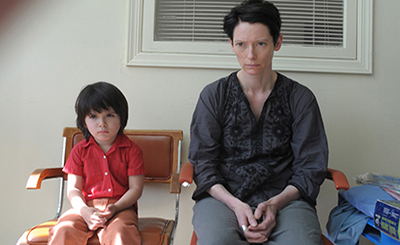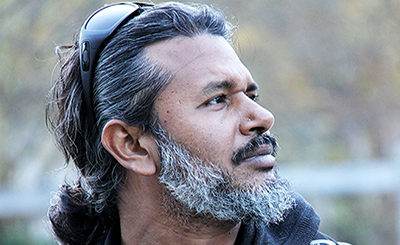
Darkness fades from the sky. The night slips out of the tenuous hold of time, as if a snake is shedding its skin — a patch of gleam here and there, but mostly dull. A new dawn descends along the shore. A sleepy sailor sets on his boat. The boat has few holes. Family and friends fill them, and hand him a pair of oars. Half-asleep, sailor pushes the boat into the choppy sea, and bids farewell to his people left behind on the island.
Someone once told him that no place belongs to anyone until a loved one is buried in its soil. The belongingness of the sailor is even deeper. The soil itself is his soul; his heart, the tender earth of the island.
Tears well up in the sailor’s eyes, and immediately retreat inside. The earth within becomes softer. At such an occasion, time often stays put with a handful of seeds in its hand. And once the agony of separation, with its pulsating force, has tilled the moist heart, time scatter these seeds, to grow them into a forest.
Similar forest of memories would soon start to grow in the sailor’s heart. It is in this forest he would be lost looking for his island. The sailor will reach new lands but forever he would look for what is buried and grows inside him. His island.
The sailor starts to moan. The people ask him not to do it. They shout, “It is a sea journey, you will need water ahead, sip these then, save these tears.” For journey, the sailor saves tears.
The turbulent sea makes the sailor fearful. The salty water slaps him from all sides, and gets into his eyes, making them burn. The sailor takes out few drops of water from his eyes and cleans them. The burning gets better. The drops, by carefully avoiding the wind, start to draw parallel lines over the sailor’s cheeks. What begins as a child’s play soon becomes a race. The wind distorts the straight lines and laughs. The sailor hears this laughter but is unable to make much sense of it. The drops tire soon. They rest on the lips, and slither inside the mouth. The sailor sighing swallows them.
The wind is a thing of its own. It is clearly wind, just a form of air, breathable, but also with an odour and taste. It has a weight to itself, as if some personality. And, likewise, the wind travels with an entourage, carrying along salty crystals, mist and an unusual heat. Birds appear rather trapped within this wind than flying of their own free will.
The bulky movement gives the wind a distinct density. One gets a feeling of being slapped wherever the wind touches. The wind’s higher density makes the sailor to take in smaller breath to be comfortable. But on a sea journey, the metaphor is not lost on him, that sailor must pay due respect to whatever natural element he encounters. Therefore, the sailor takes shallower breath, not only out of respect but also out of fear, feeling that if he breathes too much of this heavy air, he may drown.
The journey reaches a stage where it is necessary to sleep, to dream. The sailor attempts but fails. His dreams are only memories. Few pictures of his past life, that too hurriedly put together. The sailor grows restless. Not because he is unable to sleep or dream, but because he no longer can make sense of his memories. He cannot say if his memories are real or imagination. He decides to sew, with his own hands, the fabric of memories. But the sailor entangles himself in choosing the thread. Whether it is blue or red. He fails to decide, the colour of his own memories. Alone, his recollection fails. Finally, he settles with few black and white threads.
When sailor is busy sewing his memories, the holes, his people filled, are undone. The water begins flooding the boat. The cloth, still half-sewn, the sailor uses to fill the holes. He squeezes water from the cloth and returns it to the sea. Some drops he puts on his lips. But the sea dislikes the soiling of its sacrament and punishes the sailor by drawing water out of his heart.
Now even his breath is salty. He smells like sea. The journey is not only bringing the sailor closer to his destination but also stuffing him with itself. By the time the sailor would reach his place, he would become a journey in himself. A sea would forever move within his veins, rousing in him a desire to return, and when unable to do so, he would then resort to travel within himself, searching for this sea, whose sound the sailor would hear in his dreams, whose smell he would forever feel. After he would die and rest in the earth, the salinity of soil would increase, some crystals would gleam at his grave, and air near it will have a salty flavour.
By dusk, destination appears at the far edge of the sea. The boat half-filled with water gets to the shore. The sailor steps out of his boat as if rising from his grave. Two guards accost him. Ask the sailor why he is here, when he would return. The sailor turns back and looks to his own land left behind. He sees, or perhaps imagines seeing, his family and friends. All as silhouettes. He imagines the feature of their faces. He sees a wait in their eyes.
As if imagination caused some heat, the sailor’s eyes begin to melt. His heart which had hardened from the journey suddenly felt like a water-filled balloon, soft and squishy. I will return tomorrow, the sailor says. The sailor feels the taste of the salt as he speaks. The crushing of crystals gives a sonorous tone to his voice. The resulting lilt in the sailor’s speech pleases the guards. They immediately believe him and welcome him in their island. The sailor enters the island and starts preparing for the journey back home.
The sun begins to move elsewhere. While parting its way, the sun planted a kiss on the lips of the sky, making the sky blush. The resulting diffused pinkish glow welcomed the first ray of darkness. A curtain, studded with moon and stars, starts to fall. Night takes back the stage.
Night knows, just as all other natural elements know, for they have been doing it since Time, that no journey is complete until the traveller has returned to where he started. And, then the cycle goes on, endlessly, for one never knows where one had started. Only those who learn to travel within get some respite.
Comments
*Comments will be moderated











